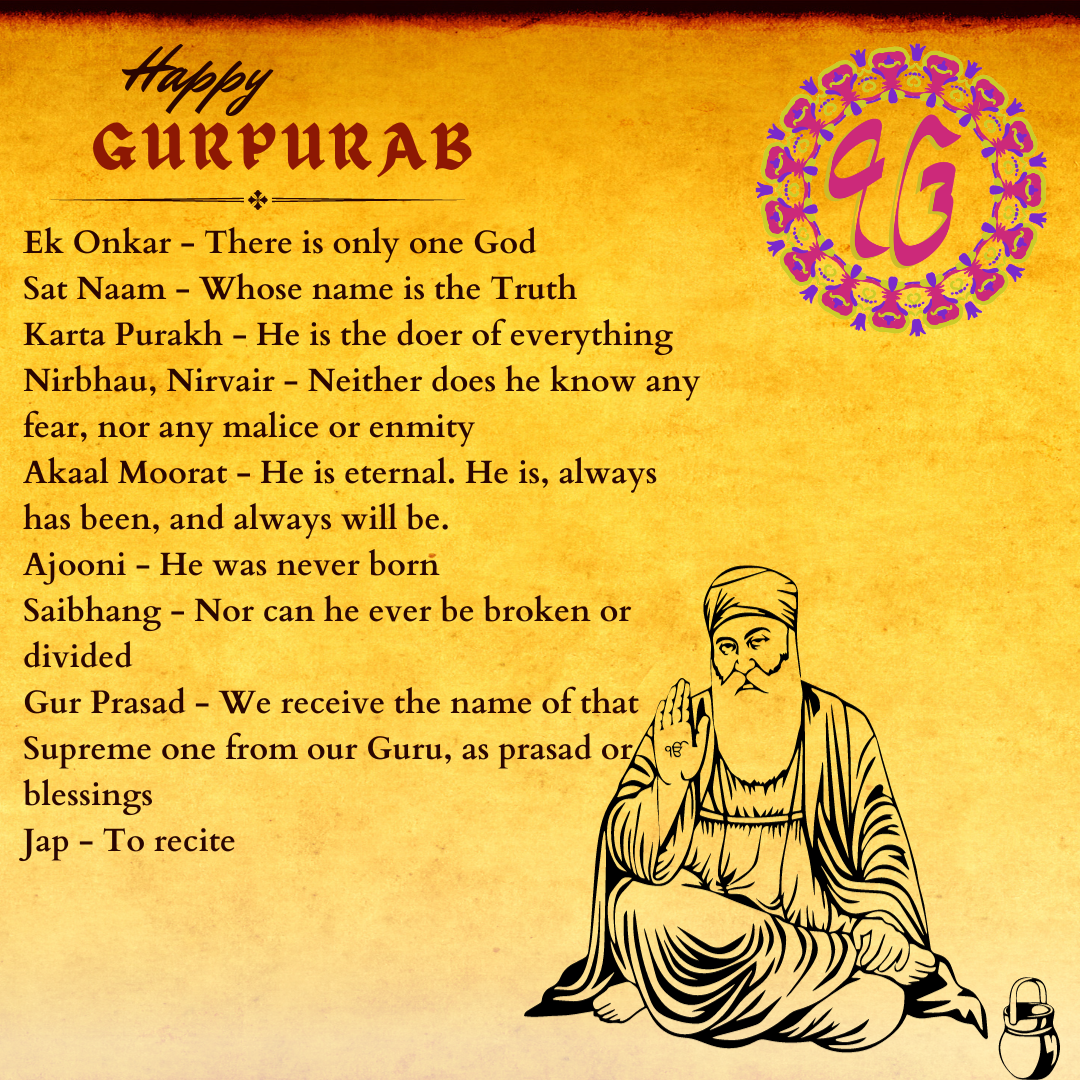Feature by Drishti Baheti
Gurpurab means – the Festival of the Guru. The Sikhs observe Gurupurabs for most of their gurus. But outside Sikhism, only one day has generally come to mean Gurpurab – the birth anniversary of the first Sikh guru – Guru Nanak Dev ji.
Gurupurab is celebrated on the Poornima पूर्णिमा (full moon) night of Kartik month of the Indian lunar calendar. This year it fell on 27th November, 2023.

The celebrations start three weeks before Gurupurab. Devotees start going for processions (called Prabhat Pheris प्रभात फेरी) accompanied by hymns in honour of the guru. The end of the Prabhat Pheris is marked as Gurupurab.
Three days before Gurupurab the Akhand Path starts which is the continuous reading of the गुरु ग्रंथ साहिब Guru Granth Sahib – the holy book of the Sikhs. The reading ends on the day of the festival.
On the day of Gurupurab, Sikhs gather at gurdwaras (Sikh temples) for special prayers and processions. The celebrations often include Nagar Kirtan (a public singing of hymns), and a vibrant and colourful street procession, where the Guru Granth Sahib is carried in a beautifully decorated palanquin. Sikhs, young and old, participate in the procession, singing hymns and showcasing the cultural heritage of Sikhism.
During Gurupurab, Sikh communities organize लंगर langar, a free meal served to all, irrespective of caste, creed, religion, or background. This practice embodies the Sikh principle of equality and community service. The practice of langar was started by Guru Nanak Dev ji. The idea was very radical at a time when people of different castes and faiths did not eat with each other. He made it necessary that everyone should be served, without asking them who they were and what they did.
At home, lamps are lit, just like on Diwali.
In the afternoon and evening, many excerpts from the Granth Sahib are sung in the Gurudwaras. Both houses and Gurudwaras are decorated and brightly lit with lights and diyas.
Gurupurab is a time of spirituality, community bonding, and service for Sikhs worldwide. It serves as a reminder of the timeless wisdom of Guru Nanak Dev Ji and the values that form the core of Sikhism.
The celebrations remind us of the principles of equality, humility, and compassion that Guru Nanak emphasised during his lifetime.
Some important principles enshrined by Guru Nanak Dev ji
Sarbat ka bhala सरबत का भला
Sarbat ka bhala means the welfare of all. This principle is, even today, central to the Sikh religion. This principle means that only in the welfare of all can the welfare of the individual be realised. This principle discourages us to think in terms of Us vs They, since everyone is deemed to be one entity.
It is because of Sarbat ka bhala that wellness centers, schools, and other welfare activities run by Sikh temples are always open to all.
Naam Japo, Wand Chhako, Kirat Karo नाम जपो, वंड छको, किरत करो
Naam Japo – Take the name of the Lord
Wand Chhako – Break bread together (this means both Langar and the sharing of one’s wealth with everyone)
Kirat Karo – Do good deeds
This is called the Rahat Maryada (code of conduct) of Sikhism. This is all that Sikhism expects from its followers – to remember God, share, and do good deeds.
Ek Onkar एक ओंकार
Onkar is the name of the cosmic sound Om.
Ek Onkar means that there is only one God. There is no division among them and therefore, no fight over one’s theism. Ek Onkar, and its constant repetition, was also a very revolutionary concept in the times of Guru Nanak, which were marked by divisions on the basis of religion, and within religion, on the basis of Vaishnavism/Shaivism, Shia/Sunni, etc.
Mool Mantar मूल मंत्र
Mool means the root of. Mool Mantra means the mantra that explains the root of everything in the universe. This mantra, given by Guru Nanak to his followers, is, even today, the first prayer recited by Sikhs in the morning. It forms the first part of the Japji Sahib – the morning prayer.
Ek Onkar – There is only one God
Sat Naam – Whose name is the Truth
Karta Purakh – He is the doer of everything
Nirbhau, Nirvair – Neither does he know any fear, nor any malice or enmity
Akaal Moorat – He is eternal. He is, always has been, and always will be.
Ajooni – He was never born
Saibhang – Nor can he ever be broken or divided
Gur Prasad – We receive the name of that Supreme one from our Guru, as prasad or blessings
Jap – To recite

